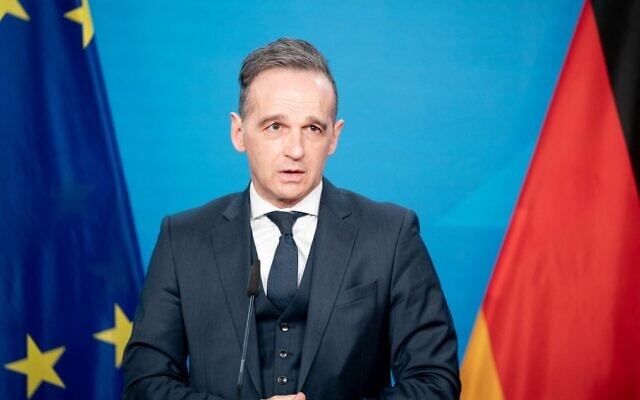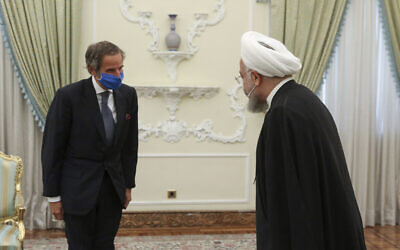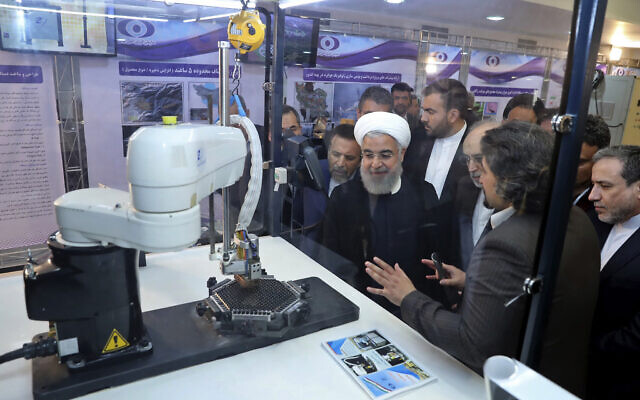As Western parties to nuke deal meet, German FM warns Iran ‘playing with fire’
Accord signatories state commitment to ensuring ‘Iran can never develop nuclear weapon,’ warn Tehran it would be ‘dangerous’ to limit UN nuclear agency inspections
By AFP18 February 2021, 9:35 pm 0

German Foreign Minister Heiko Maas gives a press statement in Berlin on February 16, 2021. (Kay Nietfeld/Pool/AFP)
PARIS — European powers and the United States on Thursday warned Iran it would be “dangerous” to limit UN nuclear agency inspections and asked Tehran to return to full compliance with a 2015 nuclear deal, while stating their commitment to “ensuring that Iran can never develop a nuclear weapon.”
Britain, France, Germany and US said after talks based in Paris that they were “united in underlining the dangerous nature of a decision to limit IAEA access” ahead of a February 21 deadline set by the Iranian parliament.
French Foreign Minister Jean-Yves Le Drian hosted his German and British counterparts in Paris, with America’s new Secretary of State Antony Blinken joining via videoconference.
Their statement urged “Iran to consider the consequences of such grave action, particularly at this time of renewed diplomatic opportunity,” adding that they all shared the aim of Iran returning to “full compliance” with the accord.
Analysts say only a small window of opportunity remains to save the deal, which received a near-fatal blow when former US president Donald Trump walked out of the accord in 2018 and reimposed sanctions on Iran.
Tehran retaliated by stepping up nuclear work in violation of the accord.
Ahead of the meeting, German Foreign Minister Heiko Maas told reporters that “The recent steps of Iran are not helpful at all, they endanger the return of the Americans” to the deal.
“Apparently Iran is not interested in easing the tensions, but in escalation. They are playing with fire,” he said.
The administration of US President Joe Biden has said it is prepared to rejoin the deal and start lifting sanctions if Iran — whose economy has been devastated — returns to full compliance.
But Tehran rejected this precondition, pressing on with increasing nuclear work in retaliation for Trump’s so-called “maximum pressure” sanctions policy to weaken the Iranian regime which has had no relations with Washington for four decades.
The Joint Comprehensive Plan of Action (JCPOA), signed in Vienna in 2015, was based on Iran providing safeguards that it would not make an atomic bomb, in exchange for a gradual easing of international sanctions.
‘Serious impact’
The diplomacy is expected to be hugely delicate and could be further derailed by the deadline set under a bill adopted by the Iranian parliament in December following the killing of top nuclear scientist Mohsen Fakhrizadeh, which Tehran blamed on Israel.
Iran would restrict some UN nuclear agency inspections by February 21 if the US does not lift the sanctions imposed since 2018.
International Atomic Energy Agency (IAEA) chief Rafael Grossi is to travel to Tehran on Saturday for talks with the Iranian authorities to find a solution for continuing inspections in the country, the agency said.
Iranian President Hassan Rouhani, right, greets IAEA chief Rafael Grossi ahead of a meeting in Tehran, Iran, August 26, 2020. (Iranian Presidency Office via AP)
It warned that the step threatened by Tehran would have “a serious impact on the IAEA’s verification and monitoring activities in the country.”
In Washington, State Department spokesman Ned Price said that Iran should provide “full and timely cooperation” with the IAEA and reverse its recent steps violating the accord.
The IAEA said last week that Iran had started producing uranium metal in a new violation of the accord, intensifying concerns it was becoming closer to having the capacity to make a nuclear weapon.
“Iran’s nuclear program is growing by the day, as the time it would take to enrich enough uranium for a single nuclear weapon shrinks,” said Ali Vaez, Iran project director at the International Crisis Group (ICG).
‘Solution for dilemma’
While Iran’s policy is ultimately determined by supreme leader Ayatollah Ali Khamenei, Iranian presidential elections in June add another time pressure factor.
Iranian Presiden Hassan Rouhani — a key advocate of nuclear diplomacy with global powers — is set to step down after serving the maximum two consecutive terms, and a more hardline figure is likely to replace him.
Ellie Geranmayeh, senior policy fellow at the European Council on Foreign Relations, said Washington should move in political and practical terms to show Iran that the Biden administration “is distancing itself from Trump-era maximum pressure.”
“There is a short window of time to limit the damage that could ensue from Iran’s next steps, for example by reducing the impact of such moves on the quality of inspections by international monitors,” Geranmayeh told AFP
.
In this April 9, 2018, photo, released by an official website of the office of the Iranian Presidency, President Hassan Rouhani listens to explanations on new nuclear achievements at a ceremony to mark “National Nuclear Day,” in Tehran, Iran. (Iranian Presidency Office via AP)
Vaez said “the seemingly impossible dilemma has a solution” if the two sides were prepared to take “closely synchronized steps.”
This would involve Washington revoking Trump’s 2018 withdrawal and greenlighting an Iranian request for an emergency IMF loan, while Iran freezes “the most problematic aspects” of its nuclear program, he said.
Khamenei emphasized Wednesday that Iran wanted to see “only action, action” from the United States.
“If we see action from the opposite side, we will act too,” he said.
Explore posts in the same categories: Uncategorized
Leave a comment